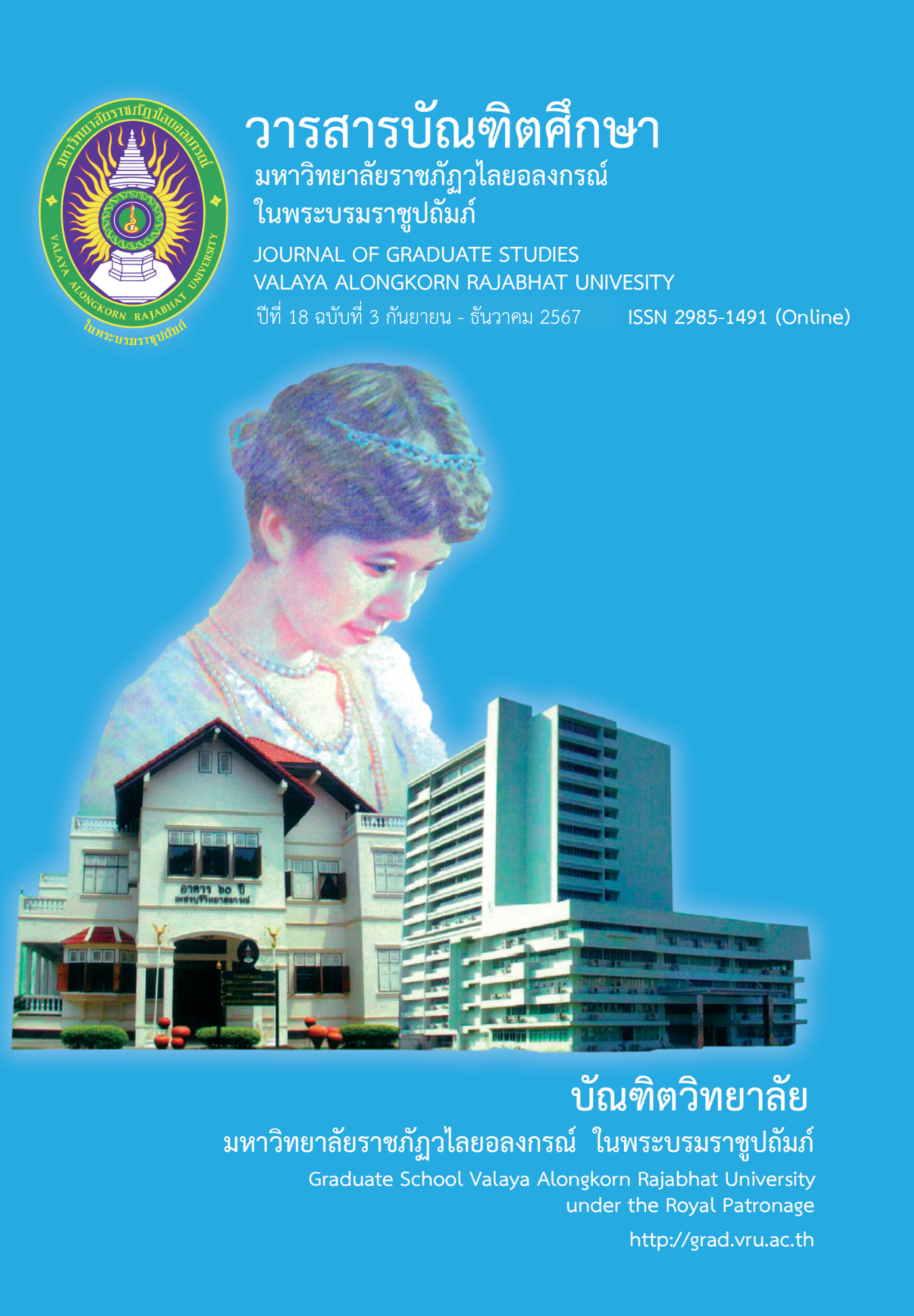การพัฒนาทักษะการคิดเพื่อจัดการชีวิตสู่ความสำเร็จของเด็กปฐมวัย ที่ได้รับการจัดประสบการณ์การปลูกผักสวนครัว
Main Article Content
บทคัดย่อ
การวิจัยนี้มีวัตถุประสงค์เพื่อ 1) เปรียบเทียบทักษะการคิดเพื่อจัดการชีวิตสู่ความสำเร็จของเด็กปฐมวัยที่ได้รับการจัดประสบการณ์การปลูกผักสวนครัวก่อนทดลองและหลังทดลอง และ 2) ศึกษาความพึงพอใจของเด็กปฐมวัยที่ได้รับการจัดประสบการณ์การปลูกผักสวนครัว โดยใช้แบบแผนการวิจัยการทดลองขั้นต้น กลุ่มตัวอย่าง คือ เด็กปฐมวัย อายุ 3-4 ปี โรงเรียนสารสาสน์วิเทศนครราชสีมา ภาคเรียนที่ 2 ปีการศึกษา 2565 จำนวน 30 คน 1 ห้องเรียน ซึ่งได้มาจากการสุ่มแบบกลุ่ม เครื่องมือที่ใช้ในการวิจัย ได้แก่ แผนการจัดประสบการณ์การปลูกผักสวนครัว แบบประเมินทักษะการคิดเพื่อจัดการชีวิตสู่ความสำเร็จ และแบบสัมภาษณ์ความพึงพอใจ สถิติที่ใช้ในการวิเคราะห์ข้อมูล ได้แก่ ค่าเฉลี่ย ส่วนเบี่ยงเบนมาตรฐาน การทดสอบค่าที กรณีกลุ่มตัวอย่างไม่เป็นอิสระต่อกัน และการวิเคราะห์เนื้อหา
ผลการวิจัยพบว่า 1) ทักษะการคิดเพื่อจัดการชีวิตสู่ความสำเร็จของเด็กปฐมวัยที่ได้รับการจัดประสบการณ์การปลูกผักสวนครัวหลังการทดลองสูงกว่าก่อนการทดลอง อย่างมีนัยสำคัญทางสถิติที่ระดับ 0.05 และ 2) เด็กปฐมวัยมีความพึงพอใจในการจัดประสบการณ์การปลูกผักสวนครัว โดยชื่นชอบ มีความสุข สนุกสนาน ตื่นเต้นกับการได้ฝึกปฏิบัติการปลูกผักสวนครัวด้วยตนเอง สามารถนำการเรียนรู้ที่ได้รับไปบอกเล่าให้ผู้อื่นทราบได้ และต้องการที่จะปลูกผักสวนครัวอีก
Article Details

อนุญาตภายใต้เงื่อนไข Creative Commons Attribution-NonCommercial-NoDerivatives 4.0 International License.
บทความทุกเรื่องได้รับการตรวจความถูกต้องทางวิชาการโดยผู้ทรงคุณวุฒิ ทรรศนะและข้อคิดเห็นในบทความ Journal of Global of Perspectives in Humanities and Social Sciences (J-GPHSS) มิใช่เป็นทรรศนะและความคิดของผู้จัดทำจึงมิใช่ความรับผิดชอบของบัณฑิตวิทยาลัย มหาวิทยาลัยราชภัฏวไลยอลงกรณ์ ในพระบรมราชูปถัมภ์ กองบรรณาธิการไม่สงวนสิทธิ์การคัดลอก แต่ให้อ้างอิงแหล่งที่มา
เอกสารอ้างอิง
Chaiakaraphong, N. (2020). kānphatthanā rūpbǣp kānčhat prasopkān dontrī thī songsœ̄m thaksa kān khit phư̄a čhatkān chīwit sū khwāmsamret nai dek pathommawai [The development of musical experimental model to enhance executive function for early childhood students]. Doctoral dissertation, Graduate School of Valaya Alongkorn Rajabhat University.
Chaiakaraphong, N., Pichayakul, T. & Klangphahol, K. (2020). Kānsưksāʻ Ongprakǭpkhǭng rūpbǣp kānčhatprasopkāndontrī thī songsoēm thaksakānkidphư̄ačhatkānchīwitsūkhwāmsamret nai dekpathomwai [A study of the components of musical experiential model to enhance executive function skills for early childhood students]. Journal of Graduate Studies Valaya Alongkorn Rajabhat University. 14(3), 65-76. Retrieved from https://so02.tci-thaijo.org/index.php/JournalGradVRU/article/view/228237/166092
Chavalier, N. (2015). The development of executive function: Toward more optimal coordination of control with age. Child Development Perspectives. 9(4), 239-244. Retrieved from https://doi.org/10.1111/cdep.12138.
Chutabhakdikul, N. (2017). Kānphatthanālæ hā khākēmāttrathān khrư̄angmư̄ pramœ̄n kānkidchœ̄ngbō̜rihān nai dekpathomwai [Tool development and evaluation criteria for assessment of executive function in early childhood]. Nakhon Pathom: Mahidol University
Gliem, A. J. & Gliem, R. R. (2003). Calculating, interpreting, and reporting Cronbach’s alpha reliability coefficient for Likert-type scales. Retrieved from https://scholarworks.iupui.edu/bitstream/handle/1805/344/gliem+&+gliem.pdf?sequence=1
Harymatee, S. (2016). EF thaksa samō̜ng phư̄a chīwit thī samret [EF Executive Function]. Retrieved from https://www.rlg-ef.com/ทักษะสมองเพื่อชีวิตที่/
Heckman, J. J. (2012). Invest in early childhood development: Reduce deficits, strengthen the economy. Retrieved from https://heckmanequation.org/resource/invest-in-early-childhood-development-reduce-deficits-strengthen-the-economy/
Kongthong, S. (2016). Krabūankān bō̜rihān bǣpmīsō̜wonrūam phư̄a phatthanā khwāmsāmāt khō̜ng samō̜ng nai kānbō̜rihānčhatkānchīwit khō̜ng dekpathomwai nai rōngrīanbānmai (wankhrū 2503) [The Participative Administration Process to Improve the Executive Function of the Preschool Children’s in Ban Mai (Mai Wankreu 2503) School]. Journal of Education Khon Kaen University. 44(2), 110-124. Retrieved from https://so02.tci-thaijo.org/index.php/EDKKUJ/article/view/243544/168824
Ministry of Education. (2017). Laksūtkānsưksāpathomwai PhutthasakrātS ǭngphanhārǭihoksip [Early Childhood Curriculum B.E. 2560]. Bangkok: Agricultural cooperative printing demonstrations of Thai Ltd.
Ministry of Public Health. (2021). thopthūan sathānakān phatthanākān dek Thai sō̜ngphanhārō̜ihoksipsī [Review of the situation of Thai child development in 2021]. Retrieved from https://nich.anamai.moph.go.th/th/general-of-50/download/?did=204370&id=71944&reload=
Onwo, A. (2020). kānphatthanā thaksa kān khit phư̄a čhatkān chīwit sūkhwāmsamret khō̜ng dek pathommawai thī dai rap kānčhat prasopkān kānprakō̜p ʻāhān tām lak pratyā khō̜ng sētthakit phō̜phīang [The development of executive functions on young children learning through the experience of sufficiency economy approach cooking]. Master of Education Thesis graduate school Valaya Alongkorn Rajabhat University.
Phanmanee, A. (2003). čhittawitthayā sāngsan kān rīan kānsō̜n [Creative psychology teaching]. Yaimai.
Seamkhumhom, et al. (2020). kān songsœ̄m kān khit chœ̄ng bō̜rihān khō̜ng dek Pathommawai [Promoting to executive functions in preschool children]. Journal of MCU Nakhondhat. 7(10), 15-31.
Sharples, J. (2018). Executive functions in education: Controlling the learning brain. Retrieved from https://www.education.sa.gov.au/sites/g/files/net 691/f/executive_ functions_in_education_controlling_the_learning_brain.pdf
Siripornpanich, V. (2021). samō̜ng khō̜ng dek pathommawai læ khwām čhampen nai kānphatthanā thaksa samō̜ng EF [Early childhood brain and the need to develop EF skills]. Retrieved from https://www.rlg-ef.com/สมองของเด็กปฐมวัย-และคว/
Thepsuriyanon, Y. (2023). thaksa samō̜ng Executive Functions (EF) samkhan yāngrai [How important are Executive Functions (EF)?]. Retrieved from http://www.acn.ac.th/articles/mod/forum/discuss.php?d=524


